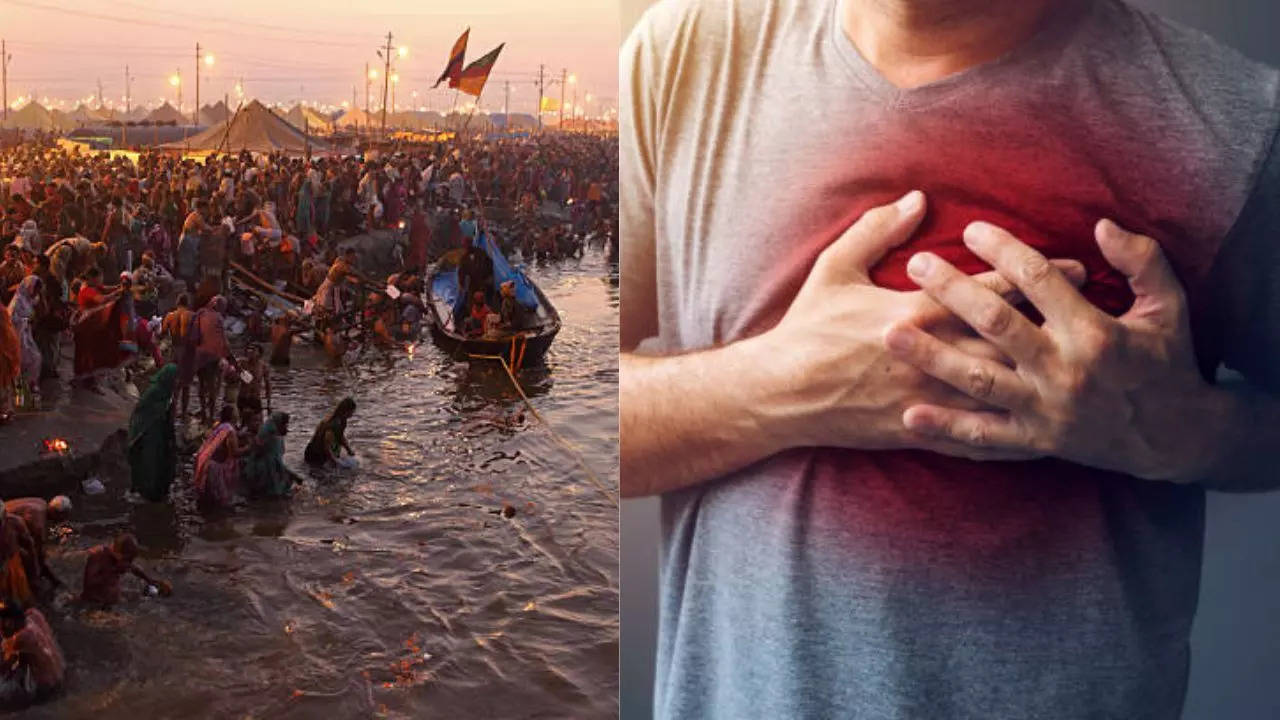Contents
11 devotees suffer heart attack in Mahakumbh Mela due to cold; Precautionary Tips for People Suffering from Heart DiseaseWhy is cold weather bad for your heart health?You should take precautions in cold weatherLimit your cold exposuredon’t work too harddon’t overheatget a flu shotdo not drink alcohol
-
news
-
Health
11 devotees suffer heart attack in Mahakumbh Mela due to cold; Precautionary Tips for People Suffering from Heart Disease
According to news reports, at least 11 devotees have suffered heart attacks at the ongoing Maha Kumbh Mela in Prayagraj, two of whom are in critical condition. Doctors say this is due to extreme cold conditions, while lakhs of people took a dip in the cold Ganga river on the occasion of Makar Sankranti. If you have heart disease, staying healthy in cold weather presents special challenges. Doctors say that for people who have coronary artery disease, cold temperatures can trigger events of cardiac ischemia. Read on to learn some tips to prevent heart problems in cold temperatures.

In people with coronary artery disease, cold temperatures may trigger episodes of cardiac ischemia.
According to news reports, at least 11 pilgrims currently visiting the Maha Kumbh Mela have suffered heart attacks, two of whom are in critical condition and have been admitted to intensive care units in Prayagraj hospitals. Doctors say that this might have happened because of this extreme cold conditionsOn Makar Sankranti, lakhs of people took a dip in the cool river Ganga.
According to experts, due to the constantly changing weather, cases of heart attacks are increasing and devotees should take special precautions.
Doctors say that two patients were sent home after treatment, while the condition of two others was critical and they were referred to the city hospital. Earlier this week, the 10-bed ICU ward of the Central Hospital located in the fair was filled with heart patients.
Why is cold weather bad for your heart health?
If you have heart disease, staying healthy in cold weather presents special challenges. Doctors say that for people who have coronary artery disease, cold temperatures can trigger episodes of cardiac ischemia — when your heart muscle doesn’t get enough oxygen. This can lead to angina pain – when the heart stops getting enough blood flow – or even heart attack.
Cold temperatures cause your blood vessels to constrict or constrict. It helps reduce heat loss from your blood to regulate your body’s normal internal temperature. Doctors say that when your blood vessels narrow, your blood pressure increases and the heart has to work harder to pump blood through the narrowed blood vessels in the body.
You should take precautions in cold weather
Although everyone should be careful during winter, especially those who have heart disease should be more careful. Follow these important tips to stay healthy:
Limit your cold exposure
When it’s extremely cold outside, limit the time spent outside or dress warmly in several layers. Cover your head and hands and wear warm socks and shoes.
don’t work too hard
According to doctors, any kind of strenuous activity in extreme cold weather can lead to a cardiac emergency for a person suffering from heart disease. it can lead to:
- angina pain
- heart attacks
- heart failure
- sudden death
don’t overheat
According to experts, while it is important to wear warm clothes, being too hot can also have adverse effects. Overheating causes blood vessels to suddenly widen or widen, causing low blood pressure that may lead to heart disease. If you’re outside in the cold and you’re sweating, you’ve overheated. If you have heart disease, consider this sweating as a danger sign. Stop what you are doing and go inside the house.
get a flu shot
The chance of getting the flu increases due to cold weather in winter and low humidity caused by indoor heating. Experts say the flu is potentially dangerous for anyone with heart disease. And so, it is important to get the flu vaccine and if you develop flu symptoms, talk to your doctor before taking any medications.
do not drink alcohol
Avoid drinking alcohol before going outside, as it dilates the blood vessels in the skin, making you feel hotter when it actually draws heat away from your vital organs.
Get the latest news live on Times Now with breaking news and top headlines from around the world.
extreme cold conditions


